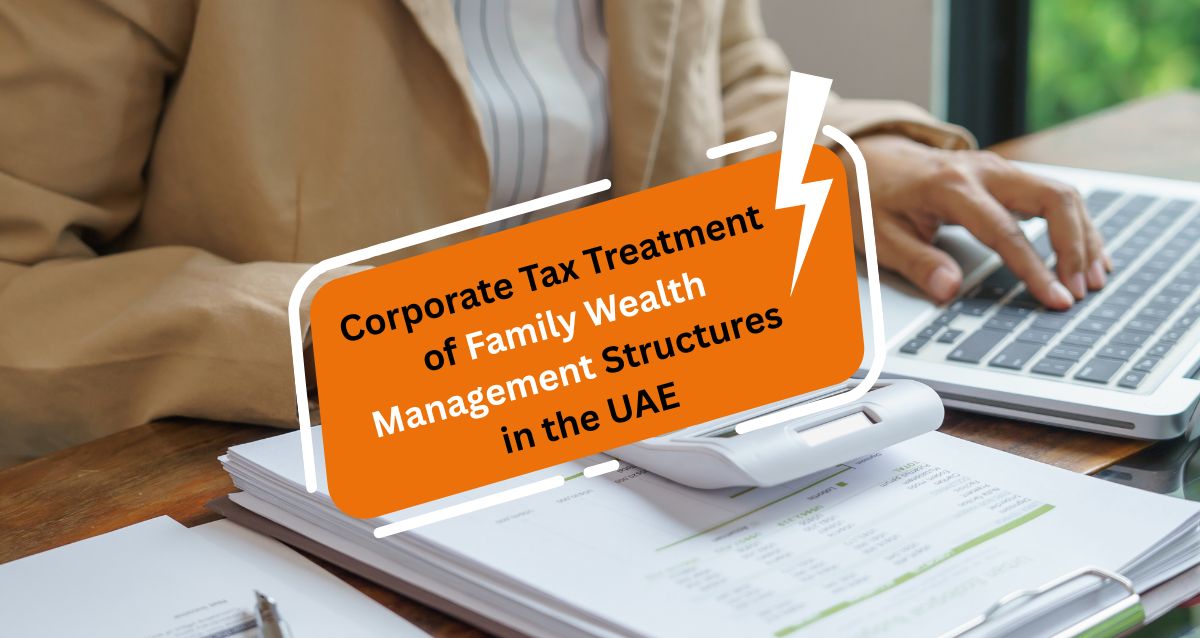Corporate Tax Treatment of Family Wealth Management Structures in the UAE
In UAE, high net worth families are considerably rely on Structured Wealth management vehicles like holding companies, family foundations and special purpose vehicles (SPVs).By forming these structures, families aiming to safeguard their assets and streamline succession planning.
With the introduction of the UAE Corporate Tax Law (Federal Decree-Law No. 47 of 2022) and related guidance under Ministerial Decision No. 261 of 2024, there has been provided a clarity on how these family wealth structures are treated under corporate.
This article helps you to understand the tax treatment of common family wealth structures including family foundations, holding companies, SPVs, and family offices. Also explores what this means for wealthy families and multi-generational enterprises in the UAE.
What Is a Family Wealth Management Structure?
Based on the clarification, a family wealth management structure usually includes combination of the following entities
- Family Foundation (or trust)
- Holding Company
- Special Purpose Vehicle (SPV)
- Single Family Office (SFO) or Multi-Family Office (MFO)
- Family members as beneficiaries
- Depending on the needs and requirements of each family, these structures often setting up in DIFC, ADGM, or RAKICC, or under the UAE
Federal Trust Law
Tax Treatment of Different Entities
1. Family Foundations
- A family foundation can apply to FTA to be treated as tax transparent, if it meets the conditions of Article 17(1) of the Corporate Tax Law
- Transparency means the income earned by family members are being taxed at the foundation level instead of taxed at individual capacity
- Family members are not subject to corporate tax in UAE on income that qualifies as personal investment income or real estate investment income.
Example:
A foundation in DIFC holding investment in real estate and listed shares. In this case Corporate tax will not be applicable to the foundation or the family members by qualifying this income as personal and real estate investment income
2. Holding Companies and SPVs
- A holding company or SPV (Special Purpose Vehicle) owned directly or indirectly by a tax transparent foundation can also apply for tax transparency with FTA
- If FTA approved the tax transparency then the dividends, capital gains, and other passive income will be free from Corporate tax.
- If FTA not approved as tax transparent, they will be treated as Taxable Persons, but may still get the benefit of:
- 0% Corporate Tax if they meets the conditions for qualifying Free Zone Person.
- Exemptions on dividends and capital gains (domestic and foreign) where they met conditions for participation exemption
Example:
A family foundation owns a Holding Company, which in turn owns SPV1 (shares) and SPV2 (real estate). If all entities granted tax transparency by FTA, no corporate tax will applies. But if SPV2 is not transparent, it will be taxed at 9% on real estate income..
3. Family Offices (SFOs and MFOs)
- An SFO or MFO may be structured as a juridical person. In that case, it is treated as a Taxable Person as per UAE Corporate tax.
- Income (for e.g. management fees, advisory fees) will subject to corporate tax. All transactions required to follow arm’s length pricing principles
- However, if the family office is set up in a Free Zone and carries out qualifying wealth management or fund management activities under DFSA/FSRA oversight, it will qualify for 0% Corporate Tax rate
Example:
A DIFC regulated MFO provides investment advisory and portfolio management. Since it is regulated by DFSA and provides qualifying services, their income will be qualifies for 0% Corporate Tax regime
4. Family Members as Beneficiaries
➤ Family members will not fall under the corporate tax on income they receive from:
- A family foundation or SPV which is tax transparent as per FTA
- Personal investment income (ie investment in shares, debentures, funds)
- Real estate investment income
➤However, if their share of business income from the respective structure exceeds AED 1 million per year, they may be subject to corporate tax
Example:
If a family member earns AED 1.5 million as profits from a commercial enterprise run by family foundation , they should mandatorily register for Corporate Tax and pay 9% on the taxable portion of the income.
Key Scenarios Explained
The below guidance showing how the treatment of tax works across common family structures:
1.Scenario 1 – Tax Transparency:
- A Foundation or Holding Company or SPVs elect for tax transparency.
- No corporate tax will be applicable on these structures. The income earned by the family members under these structures is treated as investment income.
2.Scenario 2 – No Transparency:
- SPV with real estate income which is not opted for tax transparency.
- SPV will be taxed at 9%, but dividends to family members remain exempt from tax
3.Scenario 3 – Regulated Family Office:
- MFO regulated by DFSA.
- The above structure Qualifies for 0% Corporate Tax on management income.
4.Scenario 4 – Unregulated Family Office:
- SFO with no regulatory monitoring
- They will fall under 9% corporate tax on the management fees and income earned
Why This Matters for Families
- Flexibility in structuring: Families can choose between tax transparency or 0% corporate tax by qualifying Free Zone regime depending on their requirements.
- Protection of family wealth: Formation of foundations ensure income from investments is free from corporate tax.
- Clarity on family office operations: Legally regulated family offices can benefit from preferential tax rates, while on unregulated ones standard corporate tax is applicable
- Made succession planning efficient: Wealth can be clubbed in a foundation/holding/SPV structure, thereby avoiding disputes and fragmentation.
Conclusion
The Corporate Tax treatment of family wealth management structures under Article 17 of the UAE Corporate Tax Law provides a balanced and flexible tax framework. Families can benefit from:
- Tax transparency for structures like foundations and SPV
- 0% corporate tax for regulated family offices in Free Zones which is falling under QFZ persons
- Tax Exemptions on dividends and capital gains for holding structures subject to participation exemption conditions
- No corporate tax liability for family members on passive and real estate income
However, detailed study and careful planning is required to avoid unnecessary taxation, especially for family offices and commercial business activities.
How Flyingcolour Tax Consultant LLC Can Help?
At Flying Colour Tax Consultant LLC, we assist families in:
- Setting up tax compliant family foundations, holding companies and SPVs
- Applying for tax transparency elections under Article 17
- Structuring regulated family offices for 0% Corporate Tax access
- Ensuring compliance with FTA documentation and reporting requirements
To learn more about Corporate Tax Treatment of Family Wealth Management Structures in the UAE, book a free consultation with one of the Flyingcolour team advisors.
Disclaimer: The information provided in this blog is based on our understanding of current tax laws and regulations. It is intended for general informational purposes only and does not constitute professional tax advice, consultation, or representation. The author and publisher are not responsible for any errors or omissions, or for any actions taken based on the information contained in this blog.



